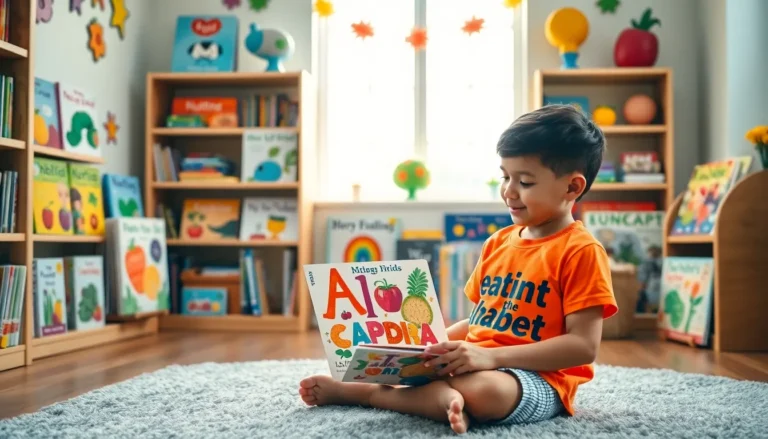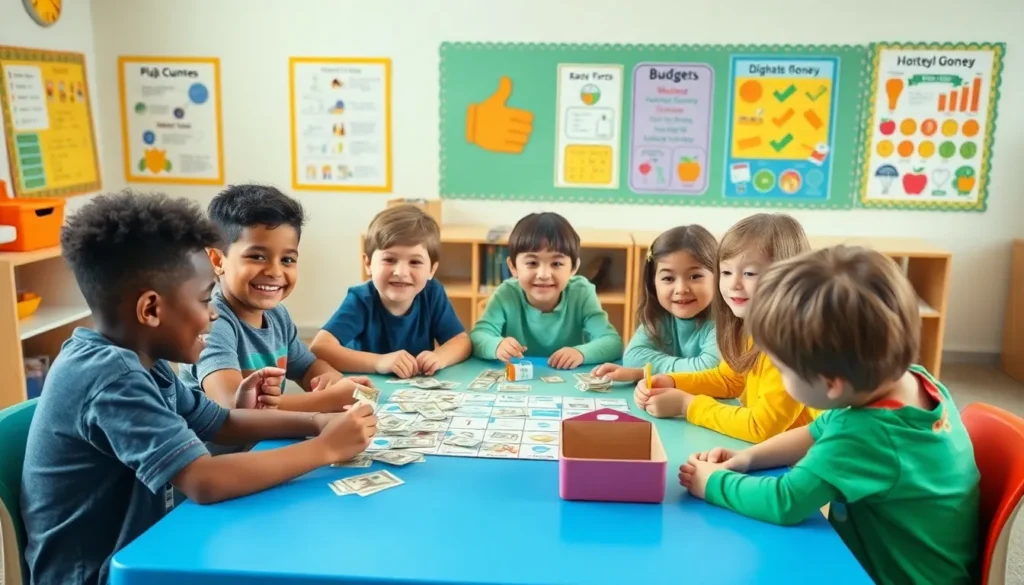Table of Contents
ToggleTeaching kids about money management is more crucial than ever in today’s fast-paced world. As financial literacy becomes a vital skill for navigating life’s complexities, instilling these lessons early can set children on a path to success. Understanding concepts like saving, budgeting, and investing can empower them to make informed decisions and avoid common pitfalls.
Parents and educators play a key role in this journey, creating opportunities for children to learn through practical experiences. By integrating financial education into everyday activities, they can foster a sense of responsibility and confidence in managing finances. As children grasp these essential skills, they’ll not only prepare for their own futures but also contribute positively to society.
Importance Of Financial Education For Children
Financial education equips children with essential skills for managing their future. Teaching them about finances early ensures they understand money management concepts that lead to responsible and informed choices.
Developing Financial Literacy Early
Developing financial literacy early sets a strong foundation for lifelong financial health. Children exposed to financial concepts understand the value of money, savings, and smart spending. Interactive activities, such as setting up a small business or managing a budget for a family event, can foster engagement and knowledge. Understanding concepts such as needs versus wants helps children prioritize spending wisely. Familiarity with banking basics and the importance of saving increases confidence as they navigate financial decisions in adulthood.
Long-term Benefits Of Financial Skills
Long-term benefits of financial skills manifest in various aspects of life. Individuals with strong financial literacy can avoid debt, make informed investment choices, and plan for retirement effectively. Studies show that financial education reduces the likelihood of financial stress in adulthood, enhancing overall well-being. Early financial skills promote responsible borrowing, investment planning, and savings habits, which influence future earning potential. Building these skills increases the likelihood of achieving financial stability and independence, allowing individuals to pursue personal and professional goals confidently.
Effective Methods For Teaching Financial Concepts

Teaching financial concepts effectively involves using engaging methods that resonate with children’s learning styles. Different approaches can enhance their understanding and application of financial literacy.
Interactive Learning Techniques
Interactive learning techniques encourage active participation, making financial concepts memorable. Examples include:
- Games: Using board games like Monopoly helps children grasp budgeting and investment strategies while having fun.
- Role-playing: Simulating real-life financial scenarios, such as shopping or managing a budget, allows children to practice decision-making.
- Hands-on projects: Creating mock business plans or managing a small allowance cultivates practical skills and responsibility.
These techniques foster enthusiasm for financial education, making learning enjoyable and impactful.
Incorporating Technology In Financial Education
Incorporating technology in financial education enhances engagement and accessibility. Effective methods include:
- Educational apps: Apps like PiggyBot or Greenlight teach children how to save, spend, and track their finances using user-friendly interfaces.
- Online games: Interactive games that simulate investing and budgeting provide experiential learning.
- Video tutorials: Utilizing platforms like YouTube offers visual explanations of complex financial topics, catering to different learning preferences.
Leveraging technology makes financial education more relatable, allowing children to connect financial principles with their daily lives.
Age-Appropriate Financial Education Strategies
Age-appropriate financial education strategies empower children at different developmental stages to understand money management. Tailored approaches help instill essential financial literacy skills effectively.
Teaching Preschoolers About Money
Introducing money concepts to preschoolers involves simple, relatable activities. Play-based learning works well, utilizing toys like cash registers or play money. Engaging in counting games with coins enhances numerical skills and recognizes denominations. Storybooks featuring financial themes can spark interest, explaining basic concepts such as saving and spending in relatable terms. Additionally, simple chores with small rewards teach the value of earning money.
Financial Lessons For Elementary Schoolers
Elementary school children can grasp more structured money management lessons. Budgeting exercises, like managing a small allowance, encourage responsible spending and saving. Fun projects, such as setting savings goals for a desired toy, foster a sense of accomplishment. Incorporating math lessons with real-life scenarios, such as comparing prices while shopping, clarifies the concept of value. Introducing the basics of investing through visual aids or simulations provides a foundation for future financial growth.
Engaging Middle Schoolers In Financial Discussions
Middle schoolers benefit from discussions about financial decision-making and real-world applications. Incorporating relevant topics, such as personal finance and the impact of advertising, encourages critical thinking. Group activities, like creating a mock business plan, simulate entrepreneurial experiences and enhance teamwork skills. Digital tools, including financial literacy apps and online quizzes, engage tech-savvy learners. Moreover, exploring the consequences of financial choices, such as credit use and debt management, prepares them for future challenges.
Resources For Parents And Educators
Parents and educators can access numerous resources to enrich children’s financial education. These resources provide crucial tools for fostering financial literacy in various settings.
Recommended Books And Materials
- “The Everything Kids’ Money Book” – This book offers engaging activities that teach children about saving, spending, and budgeting.
- “Greenbacks: A Kid’s Guide to Making Money” – Children learn the basics of money management through fun illustrations and relatable scenarios.
- “Money Math: Addition and Subtraction” – This educational material teaches foundational math skills related to budgeting and financial literacy.
- “Bunny Money” by Rosemary Wells – A children’s story that emphasizes the importance of planning and saving for purchases.
- “The Kid’s Guide to Personal Finance” – This resource provides age-appropriate insights into savings, earnings, and budgeting, making financial concepts accessible.
Online Courses And Workshops
- Khan Academy – Offers free online courses about personal finance for various age groups, incorporating interactive lessons and quizzes.
- National Endowment for Financial Education (NEFE) – Provides a range of free educational materials and resources for teachers focusing on financial literacy.
- Junior Achievement – Delivers interactive online programs that cover entrepreneurship, career readiness, and financial literacy for students from kindergarten through high school.
- Coursera and edX – Feature various financial management courses from accredited universities, allowing parents and educators to enhance their knowledge and teaching methods.
- Smart About Money – This platform offers free resources and webinars aimed at improving financial wellness for families, along with specific modules designed for children.
These resources empower parents and educators to effectively teach financial literacy, fostering informed money management habits in children.
Teaching children about financial literacy is a vital investment in their future. By equipping them with essential money management skills early on, parents and educators can foster a sense of responsibility and confidence that lasts a lifetime. Engaging methods and age-appropriate strategies make learning about finances enjoyable and relatable, ensuring children grasp important concepts.
As they navigate their financial journeys, the skills learned during childhood will serve them well in avoiding debt and making sound investment choices. With the right resources and support, children can develop a strong foundation for financial stability and independence, ultimately empowering them to achieve their personal and professional aspirations.







